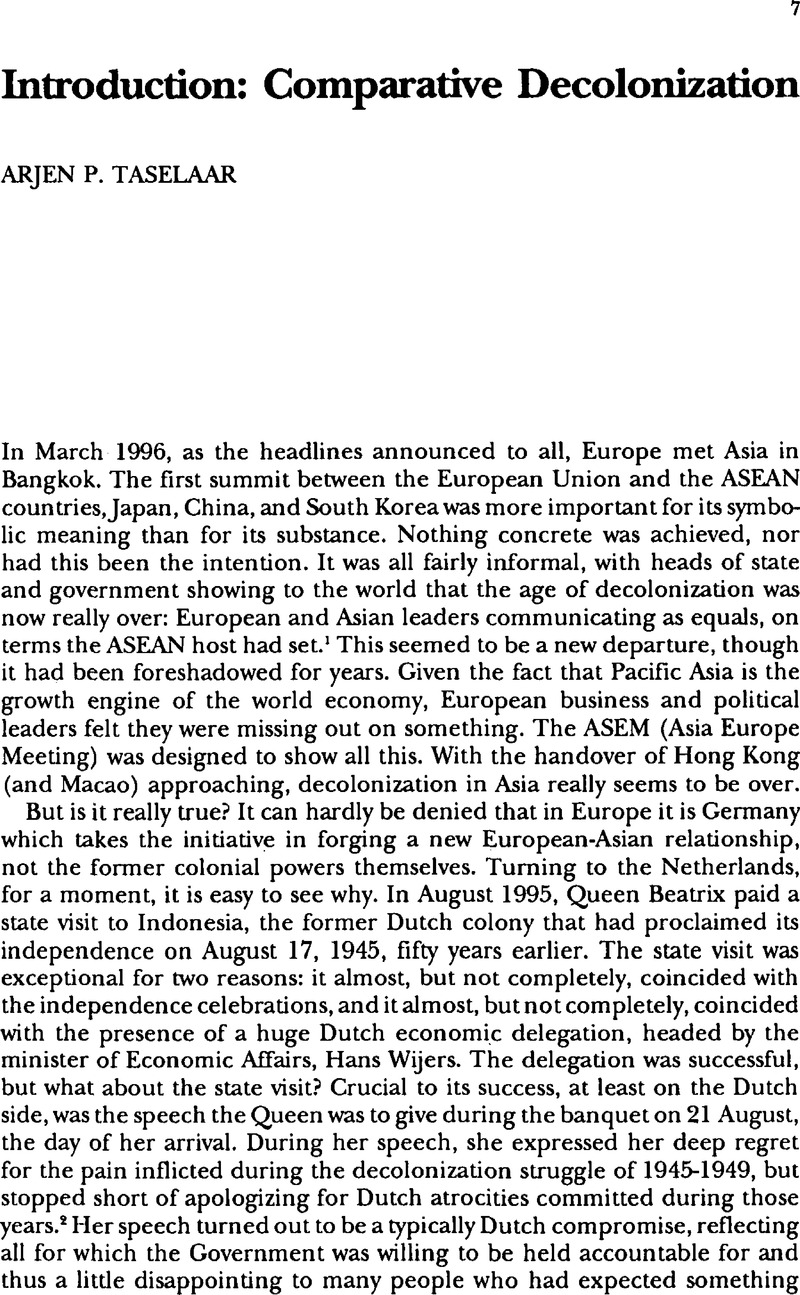No CrossRef data available.
Published online by Cambridge University Press: 22 April 2010

1 ‘Asia and Europe: Friends Apart’, The Economist, 9 03 1996, 65Google Scholar; ‘A Whole New Game: Asia-European Meeting Seems to Recast Relations’, Far Eastern Economic Review, 14 03 1996, 17Google Scholar.
2 For a translation of the speech: ‘Dialoog over Fundamentele Rechten Wordt Steeds Vanzelfsprekender’, NRC Handelsblad, 22 08 1995, 9Google Scholar.
3 Differing estimates are to be found in Hans Moll, ‘Nederland is Verpletterend Vemederd in Indonesié’, NRC Handelsblad, 29 08 1995, 9Google Scholar; Jan Bank, ‘De Vertrekdatum van Beatrix was Tactvol en Correct’, ibid.; Meijer, Remco, ‘Te laat voor het Feest Het Staatsbe-zoek, de Economische Missie en de Loden Last van het Verleden’, Elsevier, 26 08 1995, 36–39Google Scholar.
4 See, e.g., Vatikiotis, Michael RJ., Indonesian Politics under Soeharto: Order, Development Pressure for Change (revised edition, London and New York 1994) 46–47, 180–181;Google ScholarSchwartz, Adam, A Nation in Waiting: Indonesia in the 1990s (Boulder 1994) 223, 256Google Scholar; Kuhenbrouwer, Maarten, De Ontdekking van de DerdeWereld: Beeldvorming en Beleid in Nederland, 1950–1990 (The Hague 1994) 52Google Scholar.
5 Bladel, Guus van, Tussenstop Singapore: De Zaak Johannes van Damme (The Hague 1995)Google Scholar.
6 jong, Joop de, ‘Hecht Verbonden in Lief en Leed? Vijftigjaar Nederlands-Indonesische Betrekkingen’, Internationale Spectator 49 (1995)598–605Google Scholar.
7 Cf. Mierlo, Hans van, Europe and Asia: Towards a New Partnership (Leiden 1996)Google Scholar.
8 William Roger Louis and Ronald Robinson, ‘The Imperialism of Decolonization’, Journal of Imperial and Commonwealth History 22 (1994) 462–511, esp. 494–495. Cf.Google ScholarCain, P. J. and Hopkins, A. G., British Imperialism II: Crisis and Deconstruction, 1914–1990 (London and New York 1993), esp. 265–296, for a slightly different viewGoogle Scholar.
9 Charmley, John, Churchill's Grand Alliance: The Anglo-American Special Relationship, 1940–1957 (London 1995)Google Scholar.
10 White, Nicholas J., ‘Government and Business Divided: Malaya, 1945–1957’, Journal of Imperial and Commonwealth History 22 (1994) 251–274. British interests in Malaysia survived until the early 1970s. Cf.CrossRefGoogle ScholarHelten, Jean-Jacques van and Jones, Geoffrey, ‘British Business in Malaysia and Singapore Since the 1870s’ in: Davenport-Hines, R. P. T. and Jones, Geoffrey eds, British Business in Asia Since 1860 (Cambridge 1989) 157–188Google Scholar.
11 See, on Lieftinck: Clerx, J. M. M. J., ‘Financiële Verhouding tussen Nederland en Indonesiä Opnieuw Bezien, 1945–1967’, Politieke Opstellen 11–12 (1991–1992) 59–71;Google ScholarMeijer, Hans, ‘Lieftinck: Financier of Politicus?’, paper presented to the conference ‘De Leeuwen de Banteng: Nederlands-Indonesische Betrekkingen, 1945–1950’, The Hague, 27–2903 1996. On Stikker:Google ScholarWesters, Marnix F., Mr. D.U. Stikker en de Na-Oorbgse Reconstructie van het Liberalismein Nederland: Een Zakenman in de Politieke Arena (Amsterdam 1988 141–142. On the business community:Google ScholarBank, Jan, ‘Rubber, , Rijk, , Religie, : De Koloniale Trilogie in de Indonesische Kwestie, 1945–1949’, Bijdragen en Mededelingen Betreffende de Geschiedenis der Nederlanden 98 (1981) 230–259, esp. 233–245Google Scholar.
12 Moor, J. A. de, ‘Aan de Amerikanen Overgeleverd: Nederland, de Verenigde Staten en de Oorlog in Korea, 1950–1953’ in: Hoffenaar, J. and Teitler, G. eds, ‘De Koude Oorlog: MaaUchappij en Krijgsmacht in dejaren’ 50 (The Hague 1992) 163–177;Google ScholarHellema, Duco, Buitenlandse Politick van Nederland (Utrecht 1995) 148–149Google Scholar.
13 Hellema, Duco, 1956: De Nederlandse Houding Ten Aanzien van de Hongaane Revolutie en de Suezcrisis (Amsterdam 1990) 100–153Google Scholar.
14 For a general overview, see Hellema, Buitenlandse Politick, 167–199. The literature on the New Guinea crisis is vast. See, e.g., Geus, P. B. R. de, De Nieuio-Guinea Kwestie: Aspecten van Buitenlands Beleid en Militaire Macht (Leiden 1984). The ‘classic’ view isGoogle ScholarLijphart, A., The Trauma of Decolonization: The Dutch and West New Guinea (New Haven and London 1966)Google Scholar.
15 For a short comparison, see, e.g., Fasseur, C., ‘Het Verleden tot Last Nederland, de Tweede Wereldoorlog en de Dekolonisatie van Indonesië’ in: Barnouw, David, Keizer, Madelon de and Stroom, Gerrold van der eds, 1940–1945: Onverwerkt Verleden? Lezingen van het Symposium Georganiseerd door het Rijksinstituut voor Oortogsdocumentatie, 7 en 8 mei 1985 (Utrecht 1985) 133–155, esp. 146–147Google Scholar.
16 Wesseling, Henry L., ‘Mentalites et memoires’ in: Décolonisations européennes: Actes du collogue international ‘Décolonisations comparées’, Aix-en-Provence, 30 septembre - 3 octobre (Aix-en-Provence 1995) 291–297Google Scholar.
17 I follow here the interpretation of Kahler, Miles, Decolonization in Britain and France: The Domestic Consequences of International Relations (Princeton, NJ, 1984) 77–110. For another study of this kind, though written by a historian and not a political scientist, seeGoogle ScholarMurphy, Philip, Party Politics and Decolonization: The Conservative Party and British Colonial Policy in Tropical Africa, 1951–1964 (Oxford 1995)CrossRefGoogle Scholar.
18 Cf. Wesseling, H. L., ‘Dekolonisatie Vergelijkenderwijs’, NRC Handelsblad, 17 08 1995, 7Google Scholar; Wesseling, H. L., ‘Naar een Geschiedenis van de Dekolonisatie’ in his Indië Vcrioren, Rampspoed Geboren, en Andere Opstellen over de Geschiedenis van de Europese Expansie (Amsterdam 1988) 252–268Google Scholar.
19 Doise, Jean and Vaïsse, Maurice, Dipbmatie et outil militaire, 1871–1991 (Paris 1992) 602–607Google Scholar.